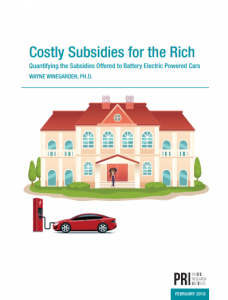Full Title: Costly Subsidies for the Rich Quantifying the Subsidies Offered to Battery Electric Powered Cars
Author(s): Wayne Winegarden, Ph.D.
Publisher(s): Pacific Research Institute
Publication Date: February 1, 2018
Full Text: Download Resource
Description (excerpt):
The federal, state, and local governments in the U.S. offer manufacturers and consumers of electric vehicles
(EVs) a wide range of subsidies. These subsidies include:
Federal manufacturing grants and loans for the purchase of electric vehicles and the
necessary infrastructure worth $40.7 billion over the lifetime of the programs;
Federal tax credits for the purchase of electric vehicles, which are worth up to $7,500 per
consumer, with a total budgetary cost of up to $2.0 billion over the lifetime of the program;
State and local tax credits for the purchase of electric vehicles that are worth up to $7,500Te for all the credits Tesla has amassed, exemplifies that these subsidies and penalties can be substantial.
There are also distributional impacts from these EV subsidies. IRS Statistics of Income data illustrate that,
for the 2014 tax year, 78.7 percent ($207.1 million) of the federal consumer tax credits were received by
households with an adjusted gross income (AGI) of $100,000 or above. A further 20.5 percent of the tax
credits ($54.1 million) were received by households with an AGI between $50,000 and $100,000. Therefore,
over 99 percent of the total tax credits went to households with an AGI above $50,000. Further, the tax
credit data indicate that the manufacturing subsidies, which also benefit the consumers of EVs, primarily
benefit households who are in the top-half of income-earners.
These data reveal that not only is the size of the EV subsidies substantial, they favor certain competitors over
others, and primarily benefit upper income households.
